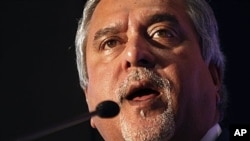India is among the world’s fastest growing aviation markets, but its airline industry is losing billions of dollars, and its second-largest air carrier, Kingfisher Airlines, his reporting record losses.
Vijay Mallya, chairman of Kingfisher Airlines, said Tuesday the company posted July-to-September quarter losses of about $93 million - double the amount lost in the same period last year.
The cash-strapped company has cancelled hundreds of flights in the last week to reduce costs.
Kingfisher’s debts amount to about $1.5 billion, and the private airline has been late paying staff salaries.
According to Mallya, high fuel prices and other operating costs make for a challenging environment. The cost of aviation fuel in India is about 70 percent higher than the global average because of taxes.
"Other than in 2008, we have never seen fuel prices as high as they are today, and the saddest part is the sales tax levied by various state governments on top of this extraordinarily high aviation turbine fuel price," he said. "This is something that needs serious attention of the state government and the central government. The industry needs this issue to be addressed immediately."
Industry-wide challenges
Kingfisher is not the only airline in financial crisis. The national carrier, Air India, has also amassed huge losses, and it is estimated that this year's combined industry losses could reach $2.5 to 3 billion.
Like many business sectors in India, aviation has also been hurt by a huge rise in interest rates in the last year. But despite the industry-wide financial burdens, passenger traffic is increasing in step with India’s growing economy, and the country is expected to have about 250 million passengers by the end of this decade.
The increased passenger traffic is breeding intense competition, forcing airlines to slash fares and buy planes to accommodate demand.
Kingfisher recently shut down its low-cost airline, a move that Mallya says will allow the company to focus on its high-end service, the so-called "royal treatment" promised to affluent clientele, an increasingly viable demographic in a country seeing unprecedented growth.
"At the top end of the pyramid, you have more tempered competition," he said. "[It's] not the cut-throat competition you have at the bottom end of the market."
Analysts predict Indian aviation will continue to face turbulence for some time, and they argue that government should allow foreign direct investment - an infusion of capital required to meet the needs of a growing country.
Mallya says Kingfisher has not sought a government bailout or additional bank funding, and that he is not worried about the long-term viability of the industry and that the airline will overcome its problems.
India’s Second Largest Airline Reports Record Losses




